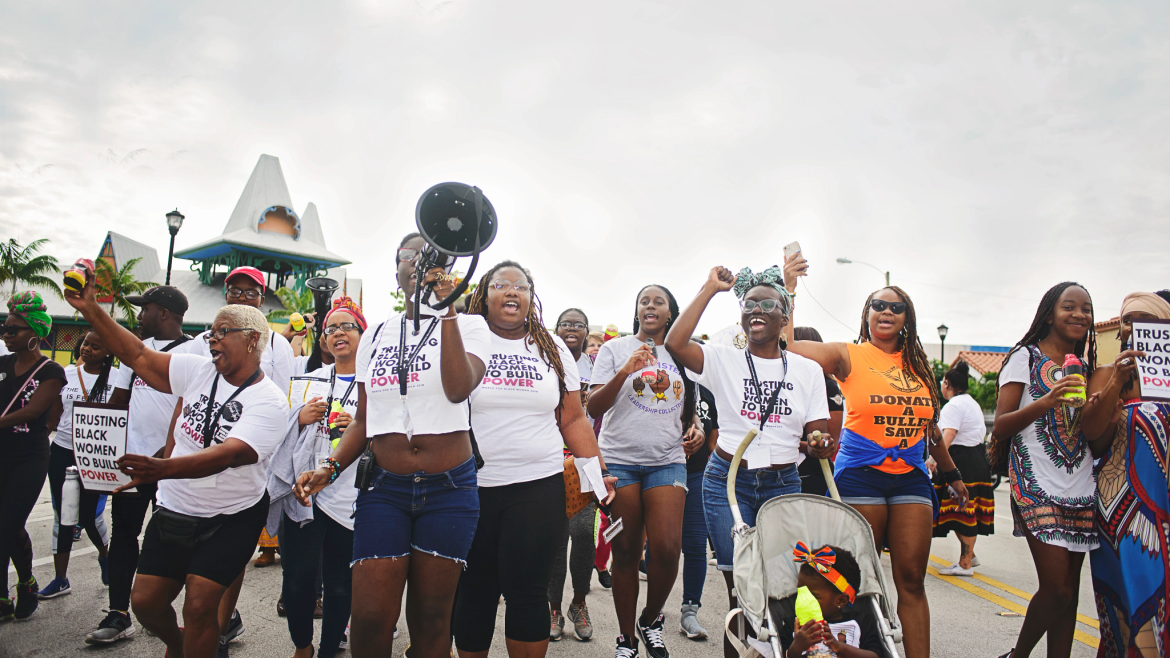By
Published
November 17, 2022
Tags
SUMMARY
The Collective Future Fund (CFF) is a donor collaborative that makes grants to transformational movements led by survivors, BIPOC women, girls, trans and non-binary people of color, that address the root causes of violence, push for structural change, and bring about collective healing. We interviewed CFF to learn more about their approach to anti-violence work and what they are learning from the field.
Lisa Skeen, Communications Officer at Schusterman Family Philanthropies, conducted the interview below with Aleyamma Mathew, Executive Director of the Collective Future Fund.
As one of the only donor collaboratives in the U.S. focused specifically on ending gender-based violence, what makes your approach crucial to the ecosystem of anti-violence work?
ALEYAMMA: Our strategic approach is shaped by our definition of violence; as a tool to uphold traditional systems of power that influence how we live our lives. This kind of violence is pervasive and exists in our houses of worship, schools, governments, media, workplaces, neighborhoods and homes.
Because violence is both interpersonal and structural, we must address all the ways violence occurs to truly eradicate it. That’s why CFF prioritizes funding for survivor-led organizations working at the intersection of gendered, racialized and sexualized violence. All of our grantee partners, like Justice for Migrant Women and the Trans Resilience Fund, are led by women and gender-expansive people of color to address the root causes of various forms of violence.
In addition to grantmaking, CFF also convenes leading donors to sharpen our sector’s analysis on gender-based violence, create supportive infrastructure for safety movements and coordinate giving to increase grantmaking impact. As a collaborative fund, CFF and our partners help ensure survivor-led movements are resourced at the level necessary to drive transformative change.
Why do you focus on supporting survivor-led organizations? What does that support look like?
ALEYAMMA: We support survivor-led work because survivors of gender-based violence are best positioned to create a collective future of joy, safety, and dignity. This means trusting the vision of BIPOC (Black and Indigenous people of color) and QTPOC (queer and trans people of color) survivors’ leadership, then providing them with financial resources that match their power and potential.
We recognize that these communities’ leadership is rooted in deep histories of resistance and survival strategies through which they have acquired the wisdom and tools needed to create the policies, practices and networks that bring us closer to a world free from violence.
What would you like donors to know about the challenges facing your work?
ALEYAMMA: Violence is steadily escalating around the world—not only in our homes and communities but also in our political, economic and social systems. Meanwhile, our society ignores efforts led by women, trans, and gender-expansive people of color to transform entrenched dominant systems, allowing violence to continue.
Survivor-leaders are doing an enormous amount of work to tackle these challenges, but they are doing it with very little sustainable fiscal support. Philanthropy has historically underfunded this work, meaning we urgently need to educate and organize donors to increase long-term sustainable and flexible funding.
Now is the time for all of us in this sector who are committed to advancing racial and gender equity to take a much more holistic and deeply intersectional approach to funding transformational work and movement-building. Our collective future depends on it.
Because violence is both interpersonal and structural, we must address all the ways violence occurs to truly eradicate it.
CFF recently announced 29 new grantees. What inspires you most about how these organizations are combatting gender-based violence?
ALEYAMMA: Creativity, innovation and interconnection were all central themes that inspired us when we selected our new grantees. These partners demonstrate an inherent understanding of how violence is disrupting their communities and what is needed to transform the conditions that create it in the first place. They have developed truly pioneering programs, strategies and services tailored to the lived experiences of the communities that they come from and who they serve.
For example, Free Hearts is led by formerly incarcerated Black women focused on ending the criminalization of survivors of gender-based violence through organizing, advocacy and wrap-around services (other services that survivors need). Waking Women Healing Institute draws a clear connection between state violence and sexual violence against Indigenous women and communities. And Matahari Women Workers Center works to address federal labor policies that fail to protect women, trans, and gender-expansive people of color in particular sectors.
What inspires us most is seeing the connections our grantees are making with each other and other movements across the globe—all who are ultimately strengthening and expanding the anti-violence ecosystem. We are seeing increasing transnational solidarity and diasporic organizing, and groups like Vida AfroLatina and South Asian SOAR are addressing cross-border issues like forced migration and climate change.
The announcement of CFF's newest grantees (Video: Courtesy of Collective Future Fund)







